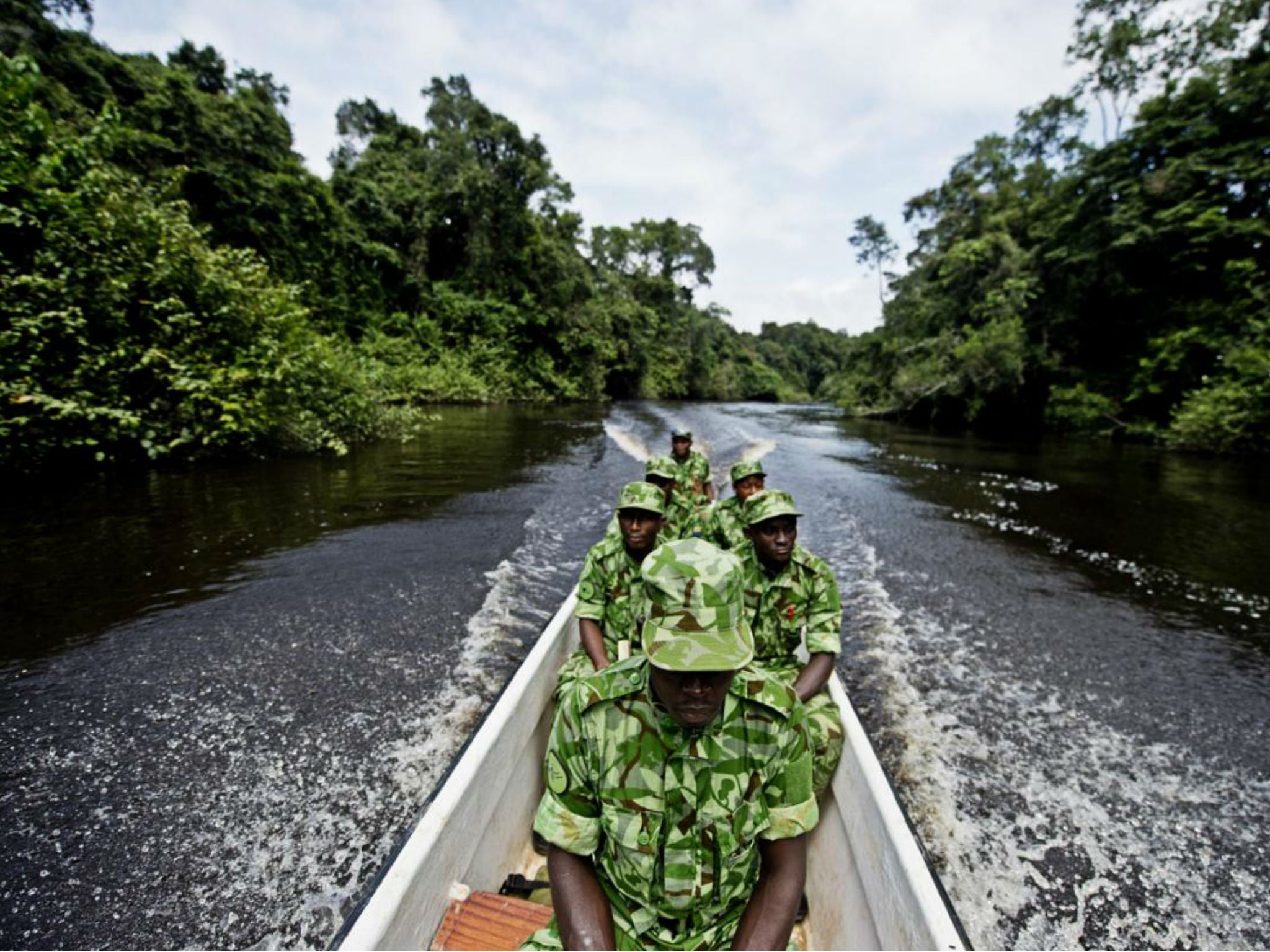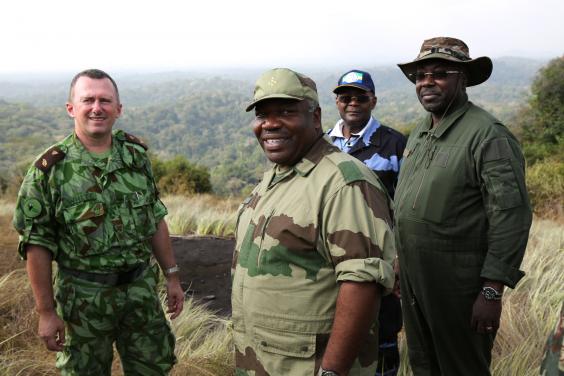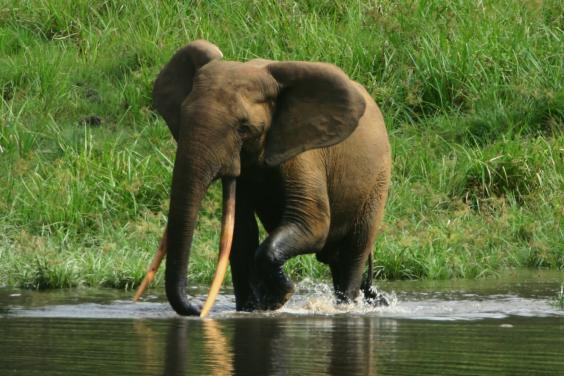On the frontline of the deadly battle in Gabon against ivory poachers
In Gabon, eco-guards face being shot at every week by heavily armed poaching gangs. Alex Dymoke visited the country ahead of the Giants Club Summit

Killing a poacher for the first time was traumatic for all involved, says Joseph Okouyi, senior wildlife warden at Minkebe national park. “My men returned fire and hit the poacher, killing him instantly. They didn’t know what to do,” he says.
In the rush to escape they failed to bury the body, an omission that proved unsettling in the week that followed. Twelve days later, fearing a bad omen, Mr Okouyi and his men ventured back into the forest in north-east Gabon to retrieve the corpse.
The journey was arduous, and the smell, when they got there, even worse, but it was a relief to do the right thing. “We had to return the body to his family,” says Mr Okouyi. “He is a human. He needs a good sleep.”
Minkebe national park is the front line in Gabon’s escalating war with poachers. Bordered by Cameroon to the north and Congo to the east, the Belgium-sized expanse of pristine rainforest is an easy target for central African gangs looking to make a quick buck from Africa’s white gold.
Gabon has around 40,000 forest elephants — roughly half the world’s population — a large proportion of which live in Minkebe. But what was once a haven for the sub-species has, for 15 years, been a site of mass slaughter.
From 2002 to 2011, poachers ran amok in the park. Beyond the reach of the authorities, a camp of 7,000 people trading ivory, gold, prostitutes and drugs sprung up amid soaring gold and ivory prices, the latter reaching a high of $240 a kilo. By the time Gabonese paratroopers razed the camp in 2011, over 10,000 of Minkebe’s elephants were dead.
A permanent battalion of 100 eco-guards and soldiers now patrol Minkebe, but poachers have returned, crossing from Cameroon in smaller groups of 10 to 50. For six months clashes have increased in frequency and intensity as hunters embraced a new tactic: shooting at eco-guards on sight.
“It’s worse than ever,” says Professor Lee White, the British-born director of Gabon’s national parks agency (ANPN). “In the past, poachers would drop their weapons and run. But recently they’ve been shooting at my men at the first opportunity.”
The escalation is driven partly by improvements in the ranger force. With training from British and US armies, ANPN guards have never been so effective at tracking and apprehending poachers. But it’s also down to pressure piled on hunters, usually poor members of the persecuted baka pygmy minority, by ruthless and brutal paymasters operating out of a military base in Djoum, just over the Cameroon border.
“People we arrest quite openly tell their story,” says White. “They were picked up in southern Cameroon, and in two thirds of cases were either employed or forced by the Cameroon military to join a poaching gang and head into the forest.”

Interrogations of arrested poachers revealed many face severe punishment – beatings, possibly worse – upon returning to Cameroon empty handed. White says: “Around six months ago the risk of being arrested, having guns and ivory confiscated and eventually being deported back to into the clutches of the poaching gangs in Cameroon started to outweigh the risks of shooting at my men.”
Poor front line poachers are mere “cannon fodder”, says White, and see little of the huge profits ivory can bring. Meanwhile, entire streets and houses in Djoum are built with money from Minkebe gold and ivory. Around 70 per cent of Minkebe's ivory passes through Cameroon, on an established the trafficking route that ends with hauls being shipped to the far east, where ivory can fetch up to $2,000 per kg.
As long as the rewards from ivory remain so high, conservationists will continue to face aggressive tactics from poachers on the front line. Last November a soldier with an eco-guard patrol was shot in the shin by a poacher armed with a Kalashnikov. The bullet exploded his bone and he had to travel three days through the forest to reach an area where a helicopter could get him out.
Minkebe’s remote location is one of the greatest challenges for ANPN staff. Intensive logging right up to the Gabonese border means Cameroonian poachers have easy access to northern regions of the park, while Prof White’s men must hike or travel by boat for four days. The helicopter is expensive, and must be used sparingly.

Despite these challenges, Gabon is committed to protecting its elephants. Since succeeding his father in 2009, President Ali Bongo has prioritised the modernisation of Gabon’s national parks. When Prof White took over ANPN the same year, it had no vehicles and just 60 staff controlling 13 national parks and three million hectares. It now employs 700 and has a budget of almost $20 million, which pays for military training, weapons and vehicles.
The improvements have been a life-line for the forest elephant, whose hard, straight tusks are prized by consumers and carvers in the Far East. The subspecies faces an especially perilous future because of the lawless and war torn regions in which it roams; densely forested parts of the Congo basin, where Kalashnikovs change hands for fistfuls of dollars. Scientists say poachers slaughtered two thirds of forest elephants in just over a decade.
To further emphasise his commitment to reversing this trend, President Bongo last year signed up to the Giants Club, the elephant protection initiative backed by the Evening Standard. On April 29-30, he will join fellow African heads of state, business leaders and conservationists at the inaugural Giants Club Summit to drive protection measures and work out a co-operative framework to deal with the poaching crisis.
If the situation in Gabon worsens, Mr Okouyi worries he will soon be forced to bury one of his own men. “If we carry on this way, I do fear one of our men will be killed. Take the incident in November — if the bullet hit him in the chest, he definitely would have died.”
On 29-30 of this month African heads of state, business leaders and conservationists will meet in Kenya at the inaugural Giants Club Summit to drive front-line protection measures and work out a co-operative frame-work for saving Africa's elephants. The Kenyan government will follow the summit by burning 105 tonnes of ivory, the largest ever amount to be burned in one go. To find out more about The Giants Club Summit go to: spaceforgiants.org/giantsclub/summit
Join our commenting forum
Join thought-provoking conversations, follow other Independent readers and see their replies
Comments
Bookmark popover
Removed from bookmarks